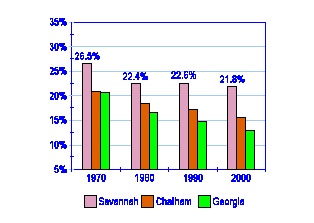Savannah, GA Anti-Poverty Task Force: Difference between revisions
No edit summary |
(adding location) |
||
| Line 1: | Line 1: | ||
{{Entity|Locale=Savannah|Region=GA|Country=US}} | |||
'''Type''': Policy | '''Type''': Policy | ||
Latest revision as of 20:43, 31 December 2014
Type: Policy
Status: Ongoing
Source File: Click here
Description:
The Vision:
A community that achieves economic self-sufficiency for its citizens.
The Mission:
To develop and strengthen public, private and human resources and advocate for policies that will contribute to the elimination of poverty in Savannah.
Why was the Task Force created?
The City of Savannah has experienced persistent pockets of poverty in the past 30 years, especially within its CDBG neighborhoods. As a result, the City's 2003-2007 Housing and Community Development Plan Advisory Committee requested the development of the Task Force.
The following tables reflect poverty levels for the city, county and state. (Note: Only one table is shown here.)
GOALS:
1. Facilitate the development of a community-wide action plan for poverty reduction.
2. Develop a continuum of care by expanding collaborative links among local, state and federal agencies and all sectors of the community.
3. Strengthen and increase accessibility of resources available to families to move them out of poverty.
4. Examine and recommend action for local and state legislative issues affecting the City of Savannah and its low-income families.
OBJECTIVES & STRATEGIES:
In order to accomplish the Task Force’s goals, four workgroups were formed. Each workgroup developed an action plan which includes objectives and strategies.
Case Management Systems Subcommittee:
- Develop a resiliency model and seamless service system.
- Identify the gaps in service provision for at-risk and stable families,
- Strengthen the relationship and communication among service providers through monthly meetings and project collaboration,
- Link the faith-based community as partners in a seamless service system.
Wage Standards Subcommittee:
- Increase public awareness of wage standards through research and outreach.
- Develop a Task Force sponsored community poverty forum,
- Compile, analyze and share data from other communities on wage standards and their effect on poverty,
- Publicize the Self-Sufficiency Standard for Chatham County, and
- Develop recommendations for family sustaining wages.
The Resource Collaboration Subcommittee:
- Increase accessibility of outreach materials and services.
- Identify the resources available to families living in poverty,
- Increase and document collaborations among agencies/initiatives,
- Enhance intra and inter-agency awareness of available resources.
The Ad-Hoc (Public Awareness) Committee:
- Change the perception of poverty to more closely match reality.
- Facilitate the creation of a community-wide Anti-Poverty action plan.
- Implement poverty simulations with key targets (e.g. schools, government, a variety of target industries such as manufacturing, health care, tourism, etc.),
- Partner with UGA’s Poverty Initiative to create a regional event focused on families living in poverty.
